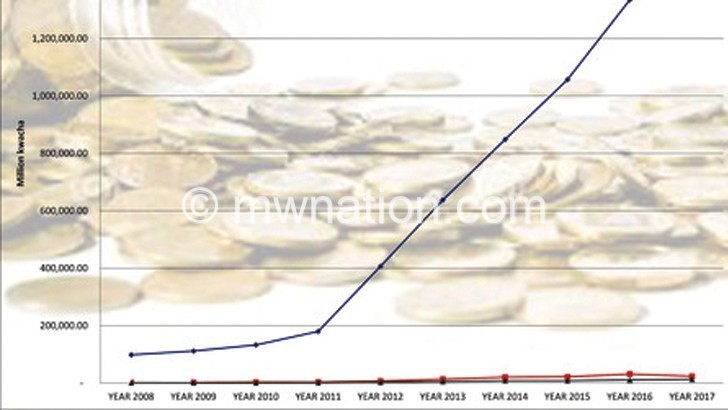Debt policy to reduce Economic risks—IMF
Treasury’s move to develop a medium-term strategy on public debt management is expected to reduce risks to the economy brought in largely due to a lack of a coherent direction on debt, the International Monetary Fund (IMF) has said.
In a written response to a questionnaire yesterday, IMF resident representative Jack Ree said addressing rising public debt, which was also undercutting the efficiency of the management of budget, requires a multi-faceted policy response.
He said up to now, the country’s debt management has lacked coherent strategy and direction.
Said Ree: “It would be a good development if government develops a medium-term public debt management policy or strategy. The structure of Malawi’s domestic debt is not exactly optimal at present. It is skewed towards short-term debt and to holdings by the central bank.
“A strong debt management framework will help weed out bad deals and improve Malawi’s financial position by reducing risks or debt servicing costs.”
He said this requires a sound medium-term fiscal framework, which would bring comfortable balance to the government’s budget position and thus reduce requirement for borrowing.
“Secondly, money that has been borrowed should also be used more wisely, leading to maximum impact to growth as one way of reducing debt. Thirdly, better public debt management also helps easing the burden the debt,” said Ree.
As of end 2006, Malawi’s public debt stood at 27 percent of gross domestic product (GDP). Now the ratio has doubled to 54.3 percent, according to figures from the International Monetary Fund (IMF).
While Malawi is not among the 18 African countries at high risk of debt distress, concerns have been raised about rising public debt which continues to increase.
As of December 2017, according to Reserve Bank of Malawi (RBM) figures, the public debt was at K2.4 trillion, of which K1.4 trillion was external debt and K1.2 trillion domestic debt.
In the 10 years to 2017, Malawi has spent K123 billion in servicing debt—money that is required to cover the repayment of interest and principal on debt for the period, out of which K52 billion was interest payments.
According to the 2018 Economic and Fiscal Policy Statement by the Ministry of Finance, Economic Planning and Development, in the medium-term, government intends to restructure the domestic debt to ensure that there is more long-term dated debt than short-term one while on foreign borrowing, government’s strategy will involve getting more concessional loans from multilateral sources.
Recently, the World Bank warned African countries, including Malawi, to borrow responsibly or risk their public debts reaching unmanageable proportions from concessional to market loans.
Said World Bank chief economist for the African Region Albert Zeufack: “This time around, the structure of debt has changed significantly.” n






